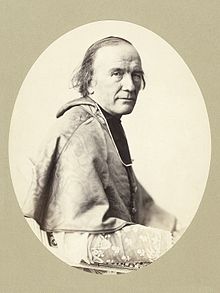Georges Darboy
| Georges Darboy | |
|---|---|
| Archbishop of Paris | |

Georges Darboy in 1865.
|
|
| See | Paris |
| Installed | January 1863 |
| Term ended | May 1871 |
| Predecessor | François-Nicholas-Madeleine Morlot |
| Successor | Joseph Hippolyte Guibert |
| Orders | |
| Ordination | 17 December 1836 |
| Consecration | 30 November 1859 |
| Personal details | |
| Born |
January 16, 1813 Fayl-Billot, Haute-Marne, France |
| Died | May 24, 1871 (aged 58) Paris, France |
| Nationality | French |
| Coat of arms |  |
Georges Darboy (16 January 1813 – 24 May 1871) was a French Catholic priest, later bishop of Nancy then archbishop of Paris. He was among a group of prominent hostages executed as the Paris Commune of 1871 was about to be overthrown.
Darboy was born in Fayl-Billot, Haute-Marne in north-east France. He studied with distinction at the seminary at Langres, and was ordained priest in 1836. Transferred to Paris as almoner of the college of Henry IV, and honorary canon of Notre Dame, he became the close friend of Archbishop Affre and of his successor Archbishop Sibour. He was appointed bishop of Nancy in 1859, and in January 1863 was raised to the archbishopric of Paris. Darboy was a strenuous upholder of episcopal independence in the Gallican sense, and involved himself in a controversy with Rome by his endeavours to suppress the jurisdiction of the Jesuits and other religious orders within his diocese. Pope Pius IX refused him the cardinal's hat, and rebuked him for his liberalism in a letter which was probably not intended for publication.
He is also known for his opposition in 1868 to Jacques-Paul Migne, forbidding him to continue his low-cost books business after the burning of his printing establishment, and suspending him from his priestly functions.
At the First Vatican Council he vigorously maintained the rights of the bishops, and strongly opposed the dogma of papal infallibility, against which he voted as inopportune. When the dogma had been finally adopted, however, he was one of the first to set the example of submission.
...
Wikipedia
